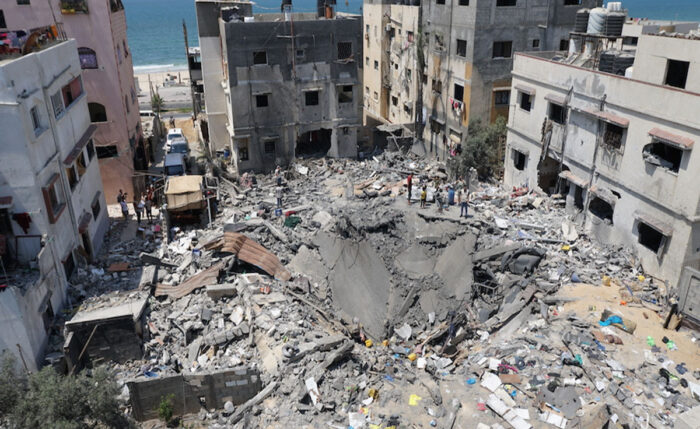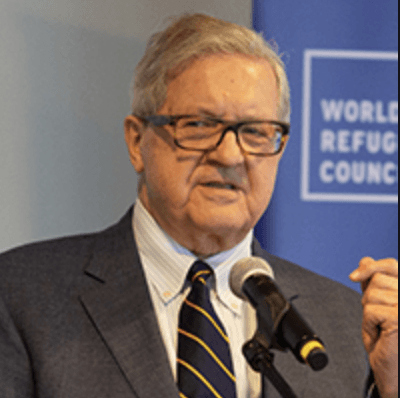Their are opportunities for Canada to support the Global Partnership on weapons of mass destruction and the safe and secure use of nuclear energy
Lloyd Axworthy, Michael W. Manulak, and Allan Rock
Canada’s G7 Presidency in 2025 offers an unparalleled opportunity to influence the international agenda. So, what should Canada’s “signature initiatives” be for the 2025 Kananaskis Summit?
While the world faces many pressing issues, the government need look no further for inspiration than the last time leaders gathered in the foothills of the Canadian Rockies.
At the 2002 Kananaskis Summit, Canada launched a Global Partnership Against the Spread of Weapons and Materials of Mass Destruction (GP). The GP has since emerged as the most important international security achievement of the G7/G8 process. At the time, the government helped to mobilize a commitment from G8 countries of $20 billion over ten years for cooperative threat reduction to counter chemical, biological, radiological, and nuclear weapons.
GP initiatives have reduced the danger of “loose nukes” from the Former Soviet Union, contributed to the destruction of Syria’s chemical weapons stockpiles, and reduced the threat posed by biological weapons.
Since Kananaskis, Canada has played a leadership role within the Partnership.
It is a major achievement. And, while much overlooked nationally, Canada’s international partners are keenly aware of its GP leadership. At a fall 2023 conference at Carleton University, for example, the U.S. Under-Secretary of State for Arms Control and International Security, Ambassador Bonnie Jenkins, lauded Canada’s strong collaboration on the GP. On a bipartisan basis, U.S. Congressional leaders and Cabinet secretaries have done likewise.
Canada could use its G7 presidency to negotiate a long-term re-commitment of G7 resources to the GP to fit a changed global context. Such a plan that would enjoy strong support in Washington no matter the outcome of the November election.
A Canadian initiative would also be timely. The world has changed greatly since 2002. Nuclear Weapons States have undertaken major modernization programs, increasing the salience of nuclear weapons and potentially fuelling a dangerous arms race. Digitization and automation of nuclear systems create new vulnerabilities to cyber-attacks, potentially compromising reliability. Russia’s nuclear sabre-rattling, combined with its positioning of tactical nuclear weapons, erodes established taboos against using such weapons.
In this unsettled context, the world could see a destabilising cascade of nuclear proliferation.
A major G7 reinvestment in the GP would have benefits reaching beyond the security space. Many countries are, for example, opting for nuclear energy to help power a net-zero future. This is a major international development amid climate and pollution crises. But it entails risks of nuclear proliferation.
Heightened support of the GP could help address this risk. The GP could be a vital tool in rediscovering high-level momentum lost since the Obama-era Nuclear Security Summit process ended in 2016.
And there is much work to do. In 2023, the Nuclear Threat Initiative documented stalled global progress in protecting weapons-usable nuclear materials and safeguarding nuclear facilities against insider threats. Support for the nuclear security work of the International Atomic Energy Agency (IAEA), key to ensuring peaceful uses of nuclear energy, has been inconsistent.
By reinforcing efforts toward safe and secure use of nuclear energy, a Canadian initiative at the G7 would add considerable impetus to the green energy transition.
Such an effort would also support badly needed progress in achieving the Sustainable Development Goals (SDGs). As observed by the IAEA’s Director General, nuclear energy and science directly supports more than half of the SDGs. Progress on ensuring peaceful uses of nuclear energy can be a powerful means of advancing global social and economic development.
GP efforts for managing bioweapons threats support national and international cooperation on pandemic preparedness, as seen during the COVID-19 pandemic.
A strengthened GP would therefore sit at the intersection of security, public health, environment, and international development.
This effort would build momentum toward the 2026 Review Conference of the Nuclear Non-Proliferation Treaty (NPT). By supporting the NPT’s peaceful uses mandate, a G7 initiative could breathe new life into the cornerstone institution of the nuclear non-proliferation regime.
GP resources should also continue to advance productive work undertaken by the IAEA, the Organizational for the Prohibition of Chemical Weapons, the Implementation Support Unit of the Biological Weapons Convention, and implementation of UN Security Council Resolution 1540.
This initiative can be pursued alongside other priorities. Strengthened support for Ukraine and advocacy of a durable peace in the Middle East should be among them. The need for post-conflict reconstruction in both contexts will be enormous. Canada should do its part to set the stage for a sustained G7 role here.
This article was first published in The Hill Times.


